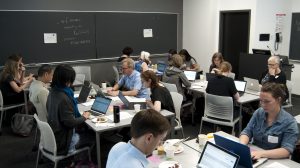During my year as a research assistant for the Downtown Eastside Research Access Portal (DTES RAP) I worked with several aspects of the portal’s development. One which stands out was working on the metadata schema, i.e., how items are described according to their content, format, and creators so that they are more discoverable for the portal’s users. In this role, I saw how challenging and involved the process can be. Two things which were important to the team were that the metadata accurately reflected the scope of items available through the portal and that the language used was appropriate to the content and diversity of users. To help with this, I attended meetings and events and participated in exercises with other members of the team for my first seven months in the position. The team used digital spreadsheets and messages, regular, dedicated in-person sessions, and methods like “card sorting” to refine the schema. A highlight was the “metadata-thon” held at Simon Fraser University in June 2019, people of various professional and technological backgrounds and provided feedback on the schema. I learned that efforts to describe things both non-judgmentally and usefully can be a long, iterative process; gaining feedback from a broad segment of information professionals, as well as the user community, is vital.
Another major part of my position was assisting in putting together a community evaluation session. Our goals were to involve community leaders and end-users in the portal’s development and to solicit feedback for immediate and future improvements. I was glad of the opportunity to add concrete, practical experience to the theoretical principles I was learning in the Library and Information Studies program. I surveyed existing literature on evaluating digital portals, an underdeveloped area in terms of published research. I was able to see how other institutions around the world handled evaluating various digital initiatives, from community heritage projects in Indonesia, to digital mapping in Scotland, to health databases in Canada. As with the metadata schema, this was an iterative process that involved multiple rewrites and consultation with team members at the UBC Library, the iSchool, and Learning Exchange.
After only nine months as a research assistant, I was able to participate in the community evaluation session I had helped create. Doing this and then analyzing the session’s results over the following months were highly rewarding aspects of the position. Seeing the evaluation process through from an initial literature review to execution and analysis gave me experiences and insights I could not have acquired through theoretical study alone. Among the many things I learned during this process were how critical community engagement is with a project of this kind, and how multifaceted are considerations in appropriately engaging with end-users so that they are included and heard, and that their valuable feedback is successfully implemented as much as possible.
These two processes – helping with the metadata schema and my work with the evaluation session – were valuable to me in my education in library and information studies and provided a breadth of different experiences. I am very happy to be part of the team, to have participated in the development and eventual roll-out of the DTES RAP, and I look forward to seeing how things progress in the future!
–
Bob Yeates, MLIS, PhD (English) was a research assistant at UBC from February 2019 to March 2020. He is now a Senior Assistant Professor at Okayama University in Japan.
